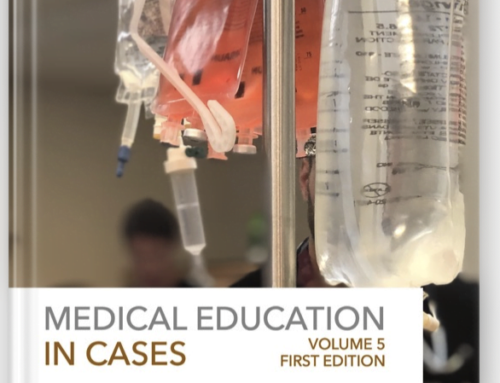 Welcome to season 5, episode 8 of the ALiEM Medical Education in Cases (MEdIC) series! Our team (Drs. Tamara McColl, Teresa Chan, Eve Purdy, John Eicken, Sarah Luckett-Gatopoulos, Alkarim Velji, and Brent Thoma) is pleased to welcome you to our online community of practice where we discuss the practice of academic medicine!
Welcome to season 5, episode 8 of the ALiEM Medical Education in Cases (MEdIC) series! Our team (Drs. Tamara McColl, Teresa Chan, Eve Purdy, John Eicken, Sarah Luckett-Gatopoulos, Alkarim Velji, and Brent Thoma) is pleased to welcome you to our online community of practice where we discuss the practice of academic medicine!
This month, we present a case of a senior resident who is overwhelmed when left to manage a busy department on a night shift while his attending physician is asleep in the back room. The resident debates whether to wake his attending and ask for help, as he worries this may be a sign of weakness or that he can’t “handle things” independently.
Check out the case and join the conversation in the comments section! We’d love to hear your thoughts on this important topic!
The Case of the Overwhelmed Senior Resident
By Shahbaz Sayed, MD, FRCPC
It had been hours since Mark had seen his supervising attending on his overnight shift. Mark was a senior Emergency Medicine resident, and as such, was tasked with “running the department.” In addition to taking handover from the previous physician, dealing with acute resuscitations, and seeing new patients, Mark was also responsible for supervising the junior resident throughout the shift. While it was certainly not his first time ‘running the department’, Mark was finding tonight’s shift particularly taxing. Several sick complex patients had come in and required extra attention and the charts of patients waiting to be seen were piling up.
“Have you seen Dr. Ezra?” Mark asked one of the nurses.
“Not in the last few hours. If he’s not seeing patients then he must be taking a nap in his office. That’s where he tends to disappear to,” she replied.
At that moment, the EMS notification phone rang: an incoming code stroke in 10 minutes. Mark sat down with a sigh to collect his thoughts. He was only a few months from graduation. All he had to do was get through his exam and the final stretch of residency and he was home free. However, as he sat there – he couldn’t help but feel despair; his department was falling apart around him, and he didn’t know what to do.
He had multiple patients who required disposition, 2 cases still to review with his junior resident, a number of patients with long wait times in urgent care, and now an incoming code stroke. How could he be ready to be a supervising physician himself if he couldn’t keep the department in check during this overnight shift? Would he struggle like this when he was all alone with no backup?
Mark shook his head as he realized he was already living in that scenario, with his attending nowhere to be found. He debated, “Should I go and wake Dr. Ezra for help? Or would Dr. Ezra simply think that I am incapable of managing the department without his support?”
As Mark contemplated his best course of action, Dr. Ezra wandered into the department.
“How are you doing?” he asked, “seems like things are starting to slip away a little bit in here! You should have come and grabbed me sooner.”
Discussion Questions
- If you were Mark, how would you respond to or handle this situation?
- How should Dr. Ezra have handled this situation as the staff person? Is it reasonable for attending physicians to leave the department for senior residents to manage?
- What does it mean to “run the department” as a senior resident? What are the expectations and at what level of training would this be appropriate?
- Why does it seem unacceptable to ask for help as a senior learner?
Weekly Wrap Up
As always, we will post the expert responses and a curated commentary derived from the community responses 2 weeks after the case is published.
Our 2 experts for this month’s case will be:
- Dr. Gus Garmel
- Dr. Eric Nadel
On June 8, 2018, we will post the curated commentary and expert responses to this case! After that date, you may continue to comment below, but your commentary will no longer be integrated into the curated commentary. That said, we’d love to hear from you, so please comment!
All characters in this case are fictitious. Any resemblance to real persons, living or dead, is purely coincidental. Also, as always, we will generate a curated community commentary based on your participation below and on Twitter. We will try to attribute names, but if you choose to comment anonymously, you will be referred to as your pseudonym in our writing.
Inspired by the Harvard Business Review Cases and initially led by Dr. Teresa Chan (@TChanMD) and Dr. Brent Thoma (@Brent_Thoma), the Medical Education In Cases (MEdIC) series puts difficult medical education cases under a microscope. On the last Friday of the month, we pose a challenging hypothetical dilemma, moderate a discussion on potential approaches, and recruit medical education experts to provide “Gold Standard” responses. Cases and responses are made available for download in PDF format – feel free to use them! If you’re a medical educator with a pedagogical problem, we would love for you to get involved in the MEdIC series! Send us your most difficult dilemmas (guidelines) and help the rest of us bring our teaching to the next level.




